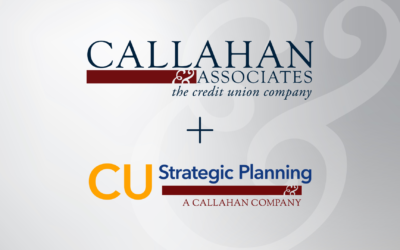People often ask me why I’m such a passionate credit union advocate. OK, to be honest, the question is usually more along the lines of “why are you obsessed with credit unions”, and the “people” in question are my friends, family, neighbors, kids’ friends’ parents, etc. And you know what’s funny? There are a lot of ways I could go about answering that question, but typically I start by telling stories.
In my nine years with Callahan, I have heard hundreds of stories about the innovative ways credit unions find to serve their members, employees, and communities. What’s more, I’ve had the privilege of interacting with credit union leaders from all over the country, and my mind is blown by the absolute devotion they have to the industry. To put it succinctly, I will never leave this industry because of the people. They care. A lot.
As I consider our Peer+ launch, I could say something similar. When people ask me how we managed to launch Peer+ with brand new features, an intuitive new design, and some seriously slick time savers, there will be so many ways to answer that question, but my answer will be the same: the people. We care. A lot.
Building Peer+ would have been daunting to anyone in the product development industry, and our team was excited to dive in and get to work.
Our goal? Take our suite of software products and rebuild from the ground up into one intuitive platform with new features to boot.
Our rule? Create nothing that would not directly empower credit unions to impact members and communities in meaningful ways.
Oh, and by the way do everything fully remote during a global pandemic. No pressure.
Our development team sat down as a group, and we all knew what got us here wasn’t going to get us there. It was time to learn.
We started by doing what any group of self-respecting technical folk would do, played ping pong, wore hoodies, and founded a space company. Just kidding! But we did study those people.
We identified the leaders in every industry and lived and breathed their different methods of development and success. Agile, Waterfall, Shape-up – the list of processes-that-sound-like-workouts continued, and ultimately, we built a process that has evolved with us over the last year+.
We opted to start with a primarily agile process. We would break down our work into digestible sprints including quality assurance. We would have frequent standing meetings to review our work, and our specs would be fully documented in Confluence.
That was the plan.
What happened next was/is an experience I wouldn’t trade with anyone. It has completely changed the way I approach my role and my work. As a team we have worked together to create a process that allows us to produce something great, but more importantly learn and grow as people too.
We went fully remote early into our Peer+ journey and immediately, one thing was immediately clear about the boxes on the screen. While we knew that our team was made up of many different people and skillset – developers, QA testers, spec writers, analysts, and of course our project manager and product manager – we soon learned that, more importantly, we were different people with different workstyles and habits, and somehow, we had to work together as a team seamlessly.
As we began to work, we realized that we had a lot to iron out, and I am not referring to programming. We were meeting and talking every day, but we weren’t communicating. That was obvious as our first nascent features rolled out, and they matched the specs but not the spirit of the feature. Our developers would have to re-code on the fly, our testers weren’t sure what they were testing for, and all of a sudden, we’re behind. To put it mildly: it wasn’t much fun.
And this is where our team’s superpowers emerged.
1) User-first Mindset: I have never worked with a group of people more devoted to the people we’re building for. As we develop new features, you can’t even imagine the debates we have regarding functionality, design, and implementation. I can’t say they’ve always been fun, but I know they led to a much better product than we would have had otherwise. Not one person on this team is content to let a feature sit that wouldn’t directly add value to our users.
2) Honesty: This goes hand in hand with #1. We’ve prioritized creating an environment where people understand what barriers to success exist and feel comfortable being honest about them to the group or offline.
At the end of every sprint, we hold a retrospective. The sole purpose of the retrospective is to celebrate our wins, yes, but also to identify every possible area of improvement, and this is the main driver of our success over time. Our team has learned to speak up and ask for what they need to do the best possible job.
These asks can run the gamut. Sometimes they’re not technical, but usually they are. It’s important to us that people actually enjoy their work, and sometimes that means asking for operational change that only seems important to the person affected. We can’t always change overnight, but at least we learn about issues, which gives us the opportunity to fix them or at least try. If we can’t make a particular change, we make sure that whoever suggests it knows why. Some of our greatest leaps forward came from the team identifying a major issue.
3) Curiosity: Our team members have been at Callahan and in the industry for varying lengths of time. They also have many different skillsets that don’t always overlap. To add to that, the industry is always evolving and so is the technology that supports it. To put it another way, there’s a lot that we don’t know as a group, and a lot that we don’t know about each other. This could lead to feelings of insecurity, and with this group, it just…doesn’t. When we don’t know something, we ask. When a lot of us don’t know something, we schedule a training. When none of us know something, we look for someone to tell us. Our willingness to be curious about what we don’t know instead of embarrassed or scared has led to some interesting new features that we can’t wait to show you.
Speaking of not knowing, we realized early on that we needed more than what our team could produce. We needed user feedback from real users, i.e., not Callahan employees; we needed to revolutionize our support process for our users; and we needed a brand-new marketing campaign. While we didn’t have these skills on our little product development team, we certainly have them at Callahan. At this point, the entire company has devoted time and energy to this launch with energy and excitement.
As we prepare to unveil our masterpiece in January, I’m so incredibly thrilled for you all to see what we’ve built. It’s downright delightful, and we’ll only continue to add more. It’s hard for me to pick a favorite new feature or explain why the design literally makes me happy. (Our designer explained that it had to do with colors and light, but that’s over my head.), but I know why this project will always feel like a success: the people.
To learn more, visit https://callahan.com/stage/support/stage/peer/.
Jennifer Davis is Vice President of Information Services & Technology at Callahan & Associates where she is responsible for the firm’s software product development, database infrastructure, data governance, and information technology.
More Blogs
Understanding Credit Union Financial Reports
The ability to understand a credit union’s financial performance is one of the most vital skills for industry suppliers and service organizations. Armed with this knowledge and having a basic understanding of a credit union’s financial reports can help sales and...
Navigating The NCUA’s 2024 Supervisory Priorities
In today's changing financial landscape, credit unions face a host of challenges when it comes to maintaining stability and ensuring member protection. Recently, the National Credit Union Administration (NCUA) outlined its supervisory priorities for 2024, highlighting...
Callahan & Associates and CU Strategic Planning Combine To Increase Credit Union Impact
Callahan & Associates and CU Strategic Planning proudly announce their strategic alliance, driven by a shared vision to empower credit unions to make a meaningful impact on their members and communities.
Insights And Advice For Credit Union Leaders
Are you new to a leadership role or preparing for one? Are you focused on empowering future leaders? Are you a veteran leader looking to be inspired? We recently asked new and established leaders what it means to embrace different leadership styles, encourage culture changes, and what advice they have for the next generation of leaders.
5 Governance Tips for Credit Union Boards
Insights From Callahan Consultant, Chris Howard There’s a growing — albeit misguided — distrust of credit unions today, making effective governance more important than ever … and harder than ever. At its core, good governance is fairly simple, although never...
15 Key Ratios Every Credit Union Board Should Know
There are thousands of data points you can share with your board about your credit union’s performance, the industry, and the economy. The challenge is identifying which key ratios are most important to your credit union. If you’re looking for a list of key ratios and...
Why Great Lakes CU Is Betting Big On Partnerships
Last week, Callahan & Associates hosted the inaugural installment in its "A Conversation With..." webinar series, featuring Great Lakes Credit Union CEO Steve Bugg. In the exclusive conversation, Bugg emphasized the value partnerships can bring to the industry and...
Browse 5300 Call Reports With Ease.
Every CU 5300 Call Report – Instantly And Seamlessly. If your goal is to reach more credit unions with your products and services, you likely know all too well how long it takes to pull 5300 Call Reports for dozens of prospects to fuel your sales pipeline and...
How Sales Teams Work More Efficiently In Peer Suite
Is your team spending countless hours manually pulling reports and compiling data for your credit union prospects? Are you looking for a more efficient way to collaborate with your team and onboard new members? Callahan’s Peer Suite helps credit union suppliers...
Ultimate Benchmarking Guide For Credit Unions
What Is Benchmarking? Benchmarking is the interpretation and analysis of financial information in order to make direct performance comparisons to other credit unions, banks, and customized peer groups. It enables a credit union to track internal goals, identify...









